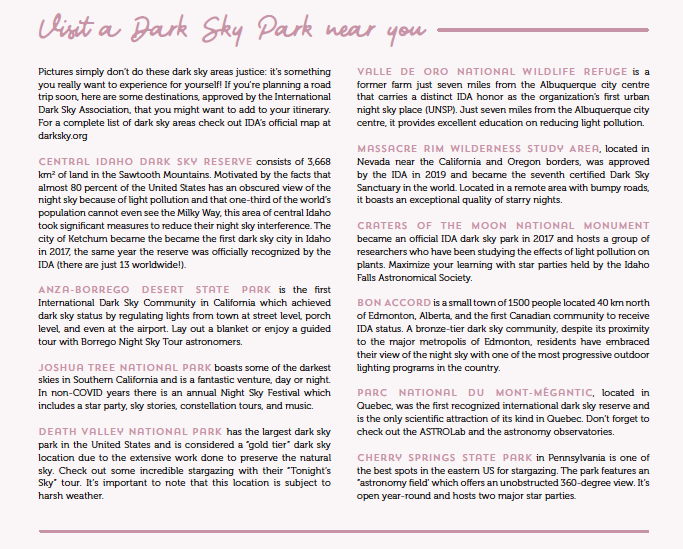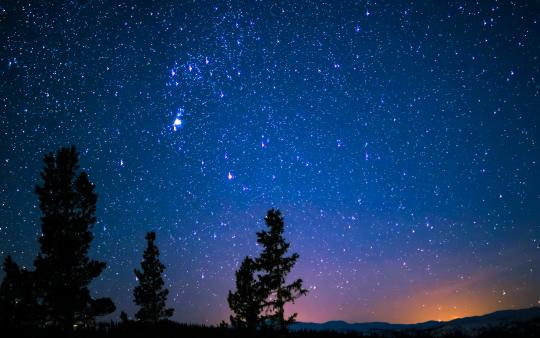Our family road trip was full of noise and splashes, the general rowdiness of being an active family with mud and trees and scraped knees on gravel. I wouldn’t trade the shrieks and laughter of our summer road trip for the world, but I had one last, quieter stop I had to make out in the middle of big Idaho sky before I was ready to go home—a “dark sky” park-in-the-making at the Bruneau Sand Dunes. While we concluded our trip with an overnight break from noise and light pollution, nestled in a simple cabin surrounded by sand and stars, it also marked the beginning of my quest to understand more about the gift that is nature’s peaceful night skies.
What is a dark sky?
A dark sky place is much more than just a random patch of night. It is an area that has actively made changes to encourage limited light pollution by instituting dark sky-friendly outdoor lighting policies and is actively educating people on the importance and benefits of dark spaces. To be designated as an official a dark sky place by the International Dark Sky Association (IDA), a park must officially apply, then agree to a series of stipulations that includes active updates and recertification. Parks aren’t the only sites that can be officially recognized as dark places: The IDA also offers certification in dark sky preserves, sanctuaries, communities, and urban night sky places.
Avoid light pollution
Light pollution does more than just obscure the stars: with its potent effects on humans and the ecosystem, excess glare and lack of natural night is true pollution.1 Increased light consumption means increased use of energy, often powered by non-renewable sources, leading to increased fossil fuel reliance. The natural sleep-wake patterns of nocturnal animals are disrupted by the presence of artificial light. A clear example of this can be seen in baby sea turtles who hatch at night and can be drawn away from the ocean, mistaking artificial lights for a “moon.”2
Some may argue that bright lighting at night has benefits for humans, specifically with regards to security, yet studies have shown just the opposite effect. According to a 2015 study, it appears that light has little correlation with crime prevention.3
Artificial lighting does, however, harm human health. Recent data connects sleep issues and increased sleep medication to the deleterious effects of outdoor lighting and these findings back up previous studies linking artificial light to interrupted circadian rhythms.4 The CDC has long known that interrupted or poor sleep causes a myriad of health problems, which includes links to chronic health issues such as diabetes, heart disease, and obesity.5 The health benefits of quality sleep are especially important for developing children.6
Go somewhere quiet
Night is not just a time of dark, but also a time of quiet. While many already understand the value of time in nature, there is an added value to time in silence. The vast, starry sky can help centre our minds—which isn’t just beneficial for busy parents, it’s also helpful for overstimulated children. In a world where we are constantly bombarded by screens, noises, and lights, moments of silence set a healthier pace. Beyond simple respite, silence has demonstrated benefits in improved memory and sleep, stimulating brain growth, stress reduction, and increased awareness.7
As parents, we are so often focused on the stimuli that developing brains require, we forget it’s also important for healthy neurology to promote a lack of stimuli too.8 Researchers have found that there are many benefits to brain downtime beyond simply turning off the TV, and quiet can support cell development in the hippocampus, leading to improved memory and enhanced senses.9
Dark sky zones offer unique family-friendly experiences that put the focus on our ecosystems first. What better way to carve out some quiet moments on your next vacation than to seek out some stars and quiet spaces on your own!

*For references visit ecoparent.ca/extras/SUM21






